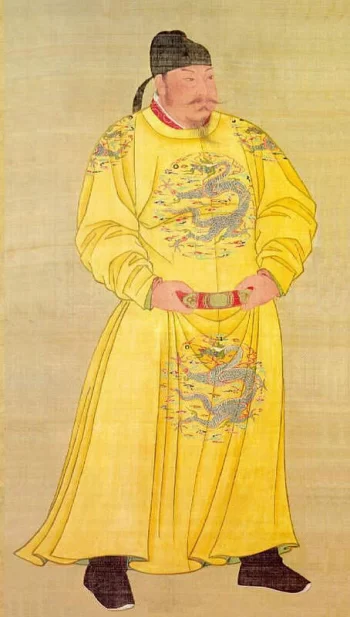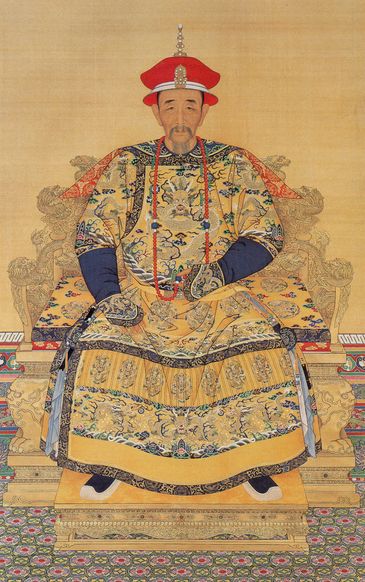(Minghui.org) (Continued from Part 1)
Emperor Taizong of the Tang Dynasty and Emperor Kangxi of the Qing Dynasty were two of the greatest figures in Chinese history. Fortunately, their wisdom, vision, and legacy were recorded in two books.
Kangxi Zhengyao
The second book was Kangxi Zhengyao (Political Essentials from the Reign of Kangxi), compiled by historian Zhang Qin during the Qing Dynasty. Emperor Kangxi was the second emperor of the Qing Dynasty and Kangxi means “peace and prosperity.” Because of his great achievements, he was considered “an emperor that on appears only every thousand years.” Like Zhenguan Zhengyao, Kangxi Zhengyao recorded the words of Emperor Kangxi as well as dialogues between him and his officials. The topics included the principles of an emperor, assigning talented officials, generosity, thrift, integrity, and others.
Zhang Qin (1861-1949), born in Ninghai County (today’s Sanmen County in Zhejiang Province), was a scholar, educator, and calligrapher. He once studied literature and history under the renowned scholar Yu Quyuan. After passing the imperial exam in 1904, he was appointed a position in the Imperial Academy.
With an avid interest in reviewing previous dynasties, Zhang had a deep admiration for Emperor Kangxi and considered him the best of all the emperors. “I humbly believe no other emperor exceeded Emperor Kangxi. He was kind like Emperor Yao, thrifty like Yu the Great, capable like Emperor Shun, and militarily strong like Tang of the Shang Dynasty,” he wrote.
Similar to Zhenguan Zhengyao, the book of Kangxi Zhengyao is made up of 42 articles. Zhang completed the book in 1910. Below are some selections from the text.


* * *
Article 2: Government
In 1686, Emperor Kangxi told his Grand Secretaries and other officials, “I believe emperors in the past were able to appeal to their subjects to be civilised not through punishment and intimidation but by promoting moral values such as cherishing goodness and not doing bad deeds. Shang Shu (Book of Documents) says, ‘Bring all kingdoms into harmony and people will become kind… An emperor needs honest officials and to treat ordinary people with generosity.’ During their reigns, Emperors Yao and Shun did things according to people’s needs and the people responded overwhelmingly. The facts proved spoke for themselves. I admire the prosperity in the ancient times, when the emperors tried to guide people and appeal to their conscience to follow a great way together.”
Article 14: Generosity and Kindness
Emperor Kangxi said to his officials, “The general public should be treated with kindness and virtue, not just managed with military force. I had to battle Galdan personally, all because of his own fault. Galdan is fierce and brutal, but I treated him with generosity and kindness. Galdan is cunning, but I was honest with him. I read in ancient literature that only those who are compassionate have no enemies. Galdan now has nothing left and sent Gelei Guyeng as an envoy, begging for peace. My decision is still appeasement.”
The officials replied, “Your Majesty is really kind and cares for people. This is unprecedented.”
Emperor Kangxi continued, “Many generals in ancient times, even if they were good leaders, killed their enemies who’d surrendered. Some of those generals did not have a good ending, and some of their offspring ended up impoverished. This is a clear warning against mindless slaughter. Some of the emperors in ancient times enjoyed fighting and wars and squandered their resources in pursuit of fame. My attitude is different. I just want the world to be peaceful and prosperous so that people can have a good life. Galdan’s envoy Gelei Guyeng can return.”
Article 28: Nature and Principle
In a preface to Xingli Daqun (Great Compendium on Human Nature and Principles), Emperor Kangxi wrote, “I think that the reason ancient sages could become emperors who led and taught people was not because of comprehensive laws; rather it was due to their good understandings of mind nature and the Tao. The importance of following the natural course of things started with Emperor Yao and Emperor Shun. When talking about heart, they said, ‘A person’s heart is selfish and dangerous, while the Tao is detailed and subtle.’
When talking about human nature, they said, ‘Following people’s nature, a king is able to find ways to appease them.’ Human beings are similar and everyone has a conscience, which inspires kindness. I plan to establish an imperial system based on it that complies with the pure heavenly virtue and kingship. This will guide people and lead everyone in the same direction. As people improve themselves, they will follow higher principles. Is there any other path except for this one?
Inheriting the achievements of Emperor Taizu and Emperor Taizong and wanting to build on the great achievements of Emperor Shizu, I worked diligently day and night to bring peace and prosperity so that everyone would benefit. Time and again, I realised that two emperors (Yao and Shun) and three kings (Yu of the Xia Dynasty, Tang of the Shang Dynasty, and Wen of the Zhou Dynasty) governed the country based on the Tao and that their Tao was based on heart. No one could have done better to analyse such heart and elaborate on it by interpreting Confucius and the Six Classics (Book of Songs, Book of History, Book of Rites, Book of Changes, Spring and Autumn Annals, and Book of Music) than Confucians in the Song Dynasty.”
Summary
Two historians, Wu Jing and Zhang Qin, left us the invaluable legacies of Emperor Taizong and Emperor Kangxi. Throughout the long history of China, they have inspired people generation after generation with the same theme. That is, by cherishing heartfelt kindness and virtue and rejecting violence, one will follow the heavenly laws and be blessed.
(The end)
Copyright © 2023 Minghui.org. All rights reserved.
